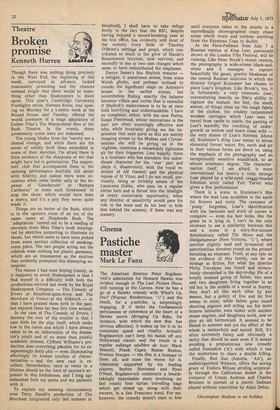Cinema
Pastiche master
Mark Le Fanu
The American director Peter Bogdanovich's admiration for Howard Hawks was evident enough in The Last Picture Show, still running at the Curzon. Now he has a go at a Hawks comedy with What's Up, Doc? (Warner Rendezvous, 'U') and the result, for a pastiche, is surprisingly engaging. If it lacks the fundamental seriousness or coherence at the heart of a Hawks movie (Bringing, Up Baby, for instance, with which the new film has obvious affinities), it makes up for it in its consistent speed and vitality. Actually Bogdanovich can't keep his hands off any Hollywood classic and the result is a regular mélange adultere de tout: Mack Sennett, Frank Capra, Buster Keaton, Preston Sturges — the film is a homage to them all, and none the worse for it. Admirably supported by his leading players, Barbra Streisand and Ryan O'Neal, Bogdanovich constructs a breathtakingly improbable story involving (at last count) four tartan travelling bags which get mixed up, along with their owners, in a San Francisco hotel. For me, however, the comedy doesn't start to bite until everyone takes to the streets in a marvellously choreographed crazy chase scene which rivals and outdoes anything from the Keystone Cops to Bullitt.
At the Paris-Pullman from July 7 a Russian version of King Lear, previously shown at the London Film Festival, will be running. Like Peter Brook's recent version, the photography is wide-screen black-andwhite and it manages to capture beautifully the gaunt, granite bleakness of the central Russian locations in which the director Grigori Kozintsev has chosen to place Lear's kingdom. Like Brook's, too, it is, fortunately, a very cinematic Lear, concentrating heavily on film's ability to capture the texture, the feel, the smell, almost, of things close up: the rough fabric of the clothes, the crudely carpentered wooden carriages which Lear uses to travel from castle to castle, the panting of Lear's mastiffs, the crackling of undergrowth as wolves and bears roam wild — the very stones of Lear's fortress. Above all, Kozintsev's King Lear seems to stress elemental forces: water, fire, earth and air in their various forms are dwelt on, using the emphasis of the photography and an exceptionally sensitive soundtrack, to an almost schematic degree. The characterisation itself, I am afraid, is more conventional but there's a truly strange Lear played by a wild-eyed, craggy-headed Estonian actor called Yuri Yarvet who gives a fine performance.
There is a scene in Kozintsev's film where the mad Lear scrabbles in the earth for flowers and roots. The carapace of ' pomp ' forgotten, Lear's identification with the bareness and truth of nature is complete — even his hair looks like the grass he is lying in. I can't be the only reviewer to see a similarity between this and a scene in a sixty-five-minute documentary called The Moon and tht Sledgehammer (New Victoria, 'U '), where another slightly mad and tyrannical old paterfamilias threshes round on the ground imitating an elephant. Truth, at any rate on the evidence of this family, can be as strange as fiction. For what the director Philip Trevelyan has found and miraculously chronicled is the day-to-day life of a totally isolated group of father, two sons and two daughters living together in an old hut in the middle of a wood in Surrey; they don't all like each other by any means, but a policy of live and let live seems to exist; while father goes round shooting pigeons and acting out his more bizarre fantasies, sons tinker with ancient steam engines, and daughters work, sew or play an old, harmoniuni. It seemed to be filmed in summer and yet the effect of the whole is melancholy and muted. Still, it's often extremely funny and obviously a rarity that should be seen even if it means avoiding a preposterous new comedy called Rentadich ('A') with which it has the misfortune to share a double billing.
Finally, Red Sun (Astoria, 'AA'), an undistinguished Western, offers the saving grace of Toshiru Mifune striding sceptically through the Californian desert in the company of Ursula Andress and Charles Bronson in pursuit of a plastic badman played without conviction by Alain Delon.






















































 Previous page
Previous page